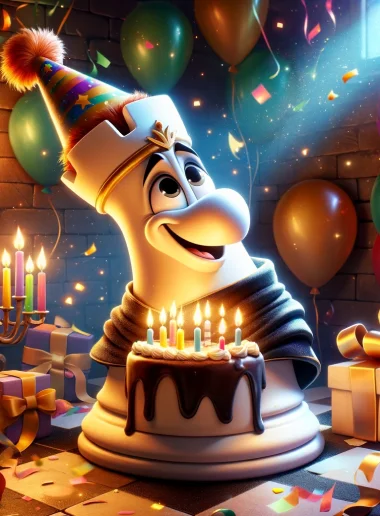6 Steps to Improve Your Chess in 2025
Most chess players stay stuck making the same mistakes year after year. This article outlines 6 practical steps to break bad habits, train smarter, and achieve real progress in 2025.
Most chess players stay stuck making the same mistakes year after year. This article outlines 6 practical steps to break bad habits, train smarter, and achieve real progress in 2025.

Most chess players will waste another year making the same mistakes and get stuck at the same rating. Here’s how you can avoid that and finally achieve real improvement in 2025.
I will outline the 6 steps you need to go through to transform your game this year. These steps will help you break bad habits, focus on what matters most, and achieve lasting progress.
Everyone wants good results. But only a few are consistently improving their chess. Here is the harsh truth:
If you want better results than the average chess improver, you need to train better than the average chess improver.
Because you have a New Year’s Resolution, I guess you aren’t completely happy with your results — or simply want to improve even faster.
That means:
New Actions → New Results.
Before you can make these new actions a habit, you need to get rid of the old ones. My suggested method for doing that in the shortest time possible is a 7-day chess detox. Yep, you read that right. If you are serious about changing the way you study for the better and stopping wasting your study time, you need a chess detox.
It is pretty simple. For the next seven days, avoid any chess activity that resembles your bad habits. These could include playing too much quick chess, solving tactics with a guess-the-move approach, or watching opening trap videos.
Leave these bad habits behind in 2024 and start with a clean slate in 2025 by going through this chess detox.
One of my Next Level Training students reported feeling “Free like a bird” after uninstalling more than a dozen chess apps on their phone. Simplicity and letting go of your bad habits will be a relieving experience.
Conveniently, you can also use these seven days to develop a plan, learn how to study properly, and change your mindset.
Speaking of mindset, that’s step 2 in our 6-step action plan.
If you are like most chess players, you care too much about your rating. You feel good when you win games; you feel bad when you lose them.
You feel smart when your rating is going up; you feel stupid when it is going down. In short, you are result-focused.
We learn this horrible mindset in school. Everything is tested and graded. Good grades = good child. Bad grades = bad child. That’s what we internalize, so it is no surprise you have the same mindset for your chess.
Here is what it does for you:
In short — it makes you feel bad — and, funnily enough, it stands in the way of better results.
If you want better results — and a more pleasurable experience — in 2025, shift your mindset to be process-focused.
Here is what you should do right now:
Shifting your mindset sets the stage for the hard training to come. Speaking of which…
Do hard things, and you’ll eliminate your competition. Seriously, nearly nobody is ready to sit down with great focus and solve difficult positions consistently.
Remember, you want new, better results. That means you need new, better inputs. When studying courses on ChessMood, fully focus and think along. Don’t just sit back and assume everything is easy.
When you play a game, you are on your own.
Train with the intensity you want to bring to every game you play. You will realize two things:
What does training hard really mean? It’s not about overwhelming yourself with impossible tasks. Hard training means using material that is slightly above your current understanding and giving it 110%.
In chess, this means calculating tactics exercises to the very end and writing down your solution before checking the answer. It’s about mastering the fundamentals with full focus, not rushing into advanced material you’re not ready for.
Training the right things as intensely as possible is hard training. Training material way above your head is just ego-boosting — and it often leads to disaster.
The internet has overwhelmed so many chess improvers. On social media, you’ll find thousands of useless pieces of advice on how to improve your game.
The reality is, only a small part of what you do really matters. This is true not only in chess but everywhere in life.
One of my favorite principles is the Pareto principle, which encapsulates this idea. It says that “80% of outcomes are derived from 20% of inputs.”
That means in chess, 80% of your rating gain will come from 20% of your training. Your task is to focus on those 20% and double down on them to get truly impressive results.
If you ask yourself, “Would it be beneficial to know this?” you’ll become overwhelmed. There are too many things in chess that you don’t know, and you don’t have enough time to study them all. Instead, ask yourself:
“Is this essential for me?”
If you want to stay consistent, you need a plan. Otherwise, you’ll fall back into old habits and avoid the hard — but important — chess training.
I started writing my own training plans when I was 18 and never stopped until I finished my career. Now, the thing my students love the most is when I write a plan for them — or help them write their own plans.
Here is what Kalea said after creating their first few plans:
“When I sit down to train now, I know exactly what I’m going to work on and I have confidence about the material… I’ve never been happier with my training.”
To write a good plan for yourself, use the acronym SMART:
With a SMART plan in hand, you’re also better prepared to handle setbacks.
Setbacks are inevitable. You’ll lose winning positions, hit plateaus, or blunder because your mind wanders. That’s part of the game.
The question is: Will you bounce back?
Setbacks aren’t failures — they’re part of the process. If you can get back to training after every disappointment, you’ll improve. Every challenge you overcome makes you stronger.
Here’s the bottom line:
If you want exceptional results, you need to do exceptional things.
Ordinary actions lead to ordinary results. Which will you choose?
These six steps are your blueprint to achieving exceptional results in 2025. Start today by committing to one change — whether it’s setting process goals, creating a SMART plan, or starting your chess detox. Remember, you’re not alone. With the right mindset, hard training, and a supportive community, your chess journey can reach new heights.
Here’s to your best year yet!
Happy New Year!
GM Noël Studer
Originally published Dec 28, 2024

